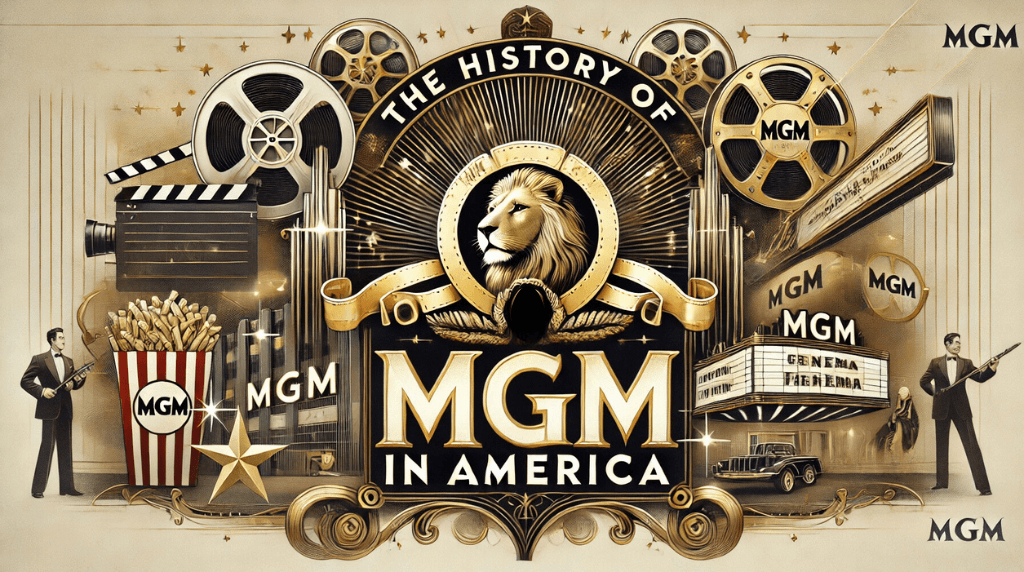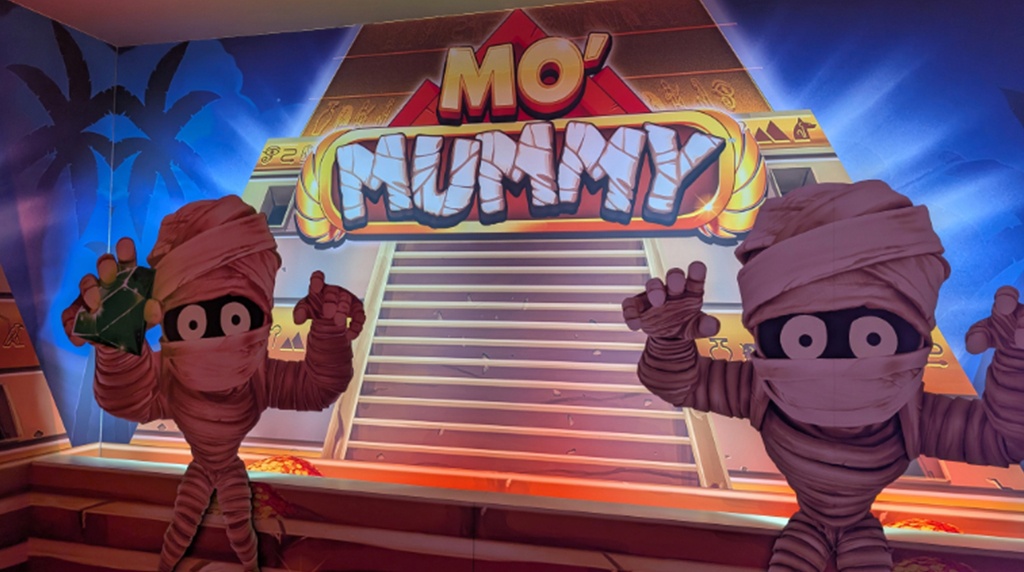Your Guide to the History of MGM in America
From “Leo the Lion” to glimmering, glitzy resorts, few names in American entertainment history resonate with the grandeur and allure of MGM—Metro-Goldwyn-Mayer. From its golden age as the titan of Hollywood’s film industry to its evolution into a multifaceted entertainment empire spanning resorts, casinos, and digital gaming platforms, the history of MGM is as sweeping as the stories it has told on the silver screen.

A detailed history of MGM in America © Dan Holmes, Boone Digital
The tale of MGM is a saga of innovation, ambition, and reinvention, set against the backdrop of an ever-changing cultural landscape. Today, it is arguably known most for MGM casino online, which many observers watch for its top online casino bonuses.
The Genesis of MGM: Stars Are Born
MGM’s story began in 1924, a time when silent films ruled the screens, and the roar of a lion was not yet synonymous with cinematic magic. Marcus Loew, a visionary theater magnate, orchestrated the merger of two studios—Metro Pictures, established by Richard A. Rowland and Louis B. Mayer Pictures. The inclusion of Mayer’s company brought with it the dynamic Louis B. Mayer, who would become one of the most influential figures in Hollywood history.
With Nicholas Schenck as Loew’s trusted associate and Irving Thalberg as its youthful “Boy Wonder” of production, MGM quickly distinguished itself. Mayer himself once remarked, “The audience is my boss,” a philosophy that fueled the studio’s lofty pursuit of entertainment excellence.
A Roaring Logo and a Legacy
No discussion of MGM would be complete without mention of its iconic “Leo the Lion” logo. Designed by Howard Dietz in 1924, the logo, featuring a lion encircled by the Latin motto Ars Gratia Artis (Art for Art’s Sake), has graced thousands of films. Leo’s commanding roar became the quintessential symbol of Hollywood glamour and remains instantly recognizable into the 21st century.
MGM’s Hollywood Triumphs
From the 1920s through the 1950s, MGM dominated the movie industry, producing a string of blockbusters and fostering some of the greatest talents in film history. The studio’s films became cultural milestones, from the timeless charm of The Wizard of Oz to the sweeping epic Gone with the Wind. Among its crowning achievements was the 1959 masterpiece Ben-Hur, a cinematic event that won 11 Academy Awards and epitomized MGM’s penchant for grandeur.
MGM also became a launching pad for stars like Judy Garland, Clark Gable, and Elizabeth Taylor. Greta Garbo, one of the studio’s most luminous icons, said of MGM, “It is not just a studio—it is an empire of dreams.”
MGM’s Film Library and Turner’s Acquisition
MGM’s vast film library became a treasure trove, its value increasing exponentially over the decades. In 1986, media mogul Ted Turner acquired MGM, primarily to secure its library of classics.
While the studio itself eventually returned to independence, the Turner acquisition underscored the enduring worth of MGM’s cinematic heritage. Today, that library is a cornerstone of the streaming era, making it one of the most valuable collections of intellectual property in the world.
Evolution Into Gaming and Resorts
In the 1960s, MGM began diversifying into the hospitality and gaming sectors. The company established its presence in Las Vegas, transforming the city into the global capital of entertainment.
With the opening of the original MGM Grand in 1973—then the largest hotel and casino in the world—MGM Resorts Las Vegas became synonymous with luxury and spectacle.
Over the years, MGM properties like Bellagio, Mandalay Bay, and MGM Grand Las Vegas have set the standard for world-class hospitality. MGM was integral in shaping Las Vegas into the glittering gambling mecca it is today.
The brand extended its reach to Atlantic City and beyond, cementing its legacy as a leader in the gaming and hospitality industries. As digital technology transformed the gambling world, MGM launched BetMGM online casinos, blending its storied name with cutting-edge gaming platforms.
Key Milestones in MGM History
- 1924: Metro-Goldwyn-Mayer (MGM) is formed through the merger of Metro Pictures and Louis B. Mayer Pictures.
- 1928: MGM produces its first talkie, White Shadows in the South Seas.
- 1939: The Wizard of Oz premieres, becoming one of MGM’s most beloved films.
- 1959: Ben-Hur is released, winning 11 Academy Awards and becoming a cultural phenomenon.
- 1973: MGM Grand Hotel opens in Las Vegas, revolutionizing the city’s hospitality scene.
- 1986: Ted Turner acquires MGM for its extensive film library.
- 2000: MGM Mirage (later MGM Resorts International) is formed, expanding the company’s casino and resort footprint.
- 2018: MGM launches BetMGM, marking its entry into online sports betting and casino gaming.
- 2022: Amazon acquires MGM film division, securing its film library and studio operations.
MGM in the Digital Age
The transition to the 21st century has posed challenges for legacy brands like MGM. To stay relevant, the company has embraced digital platforms. Such is the BetMGM online casino – a strategic platform with the purpose of attracting a younger demographic.
MGM’s reinvention is also evident in its embrace of eSports, live entertainment, and immersive resort experiences. In a digital era dominated by streaming and gaming, MGM continues to innovate while honoring its legacy.
Importance of MGM Resorts Las Vegas
The MGM name remains synonymous with luxury and entertainment in Las Vegas. Current MGM properties include iconic resorts like:
- MGM Grand Las Vegas: A landmark resort known for its opulence and entertainment offerings.
- Bellagio: Famous for its fountains and elegant accommodations.
- Mandalay Bay: A resort that blends relaxation with high-energy attractions.
- Park MGM: A modern take on the Las Vegas experience, appealing to a new generation of travelers.
Through its sprawling resorts and casinos, MGM continues to be a pillar of the Las Vegas economy, attracting millions of visitors annually.
From its origins as a Hollywood powerhouse to its status as a global leader in hospitality and gaming, the history of MGM is a testament to the enduring power of vision and innovation.
Its film legacy, epitomized by classics like Ben-Hur, remains timeless, while its foray into digital platforms like BetMGM history marks a bold step into the future.
As entertainment legend Cary Grant once said, “MGM wasn’t just making movies; they were creating an ideal, a golden age.” That ideal, however, is not frozen in time. The company continues to evolve, ensuring that its roar is heard by generations to come.
The history of MGM is a journey through the heart of American entertainment. From the grand cinema of Hollywood’s golden age to the glittering resorts of Las Vegas and the dynamic world of online gaming, MGM embodies the spirit of reinvention.
With its eye on the future and a legacy that echoes through time, the company remains a name synonymous with excellence, entertainment, and innovation.
 7 Politically Incorrect Slots for the Connoisseur Who’s Seen It All
7 Politically Incorrect Slots for the Connoisseur Who’s Seen It All
 Casino Payment Delay Red Flags: When Waiting Is a Concern
Casino Payment Delay Red Flags: When Waiting Is a Concern
 US Оnline Casinos Turn to Celebrities to Attract Consumers
US Оnline Casinos Turn to Celebrities to Attract Consumers
 Inside G2E Las Vegas 2025, from Prediction Markets to Marble Runs
Inside G2E Las Vegas 2025, from Prediction Markets to Marble Runs